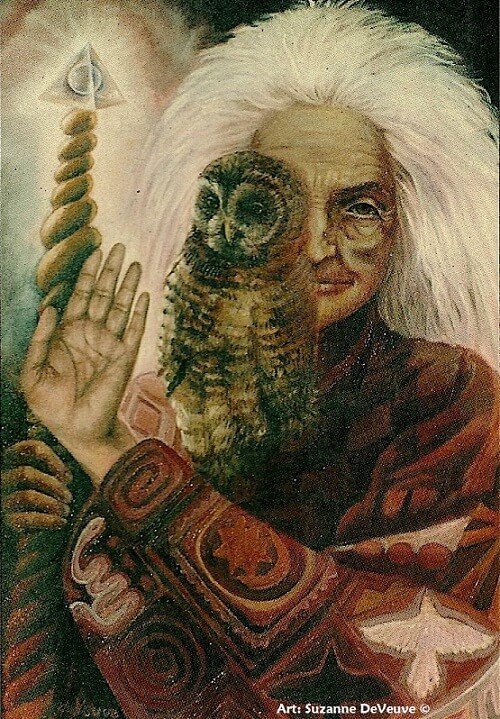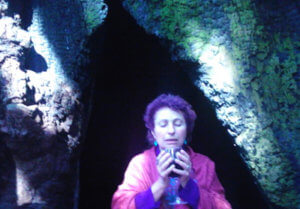
{Guest Post}
By Melinda Voss ©
The Des Moines Register
In Ancient times, older women were the keepers of primal Mysteries and were revered for their special wisdom.
Clad in purple, surrounded by memorabilia, Linda Sanda stood in her Urbandale, Iowa, dining room and talked about turning 50. About 40 close friends, co-workers and family members came to mark the occasion. But there were no mocking black balloons or teasing “You’re Over the Hill” banners.
This was a Croning Ceremony, designed to invoke Spiritual reflection, dignity and wisdom. An Ancient Rite of Passage to Honor older women, Croning Ceremonies had become nearly extinct. But they are making a comeback. And they’re going mainstream.
Many women are evaluating what it means to stand on the threshold of old age.
For some women, Croning Ceremonies serve as an ideal way to make a statement about that passage. “I see so many people fighting the aging process,” says Sandra Bury, another Des Moines-area woman who went through the Ritual. “I wanted to celebrate that to become old is a gift. I didn’t want to be afraid of it.”
The rising interest in Croning Ceremonies also reflects a larger movement to reassert the value of older women, according to the book: “Woman of Ages, Celebrating Ourselves”
In Ancient Times, she says, old women were known as Crones. They held Power and enjoyed status as “the Healers, the Mediators, the Wise of the Communities.” Gradually, that Power and recognition were lost. In modern times, the old woman has become nearly invisible, pushed aside and forgotten.
“We don’t listen to her. We shut her up,” Only a few groups – blacks, Native Americans, Asians – Honor old women.
To recapture the value of becoming a Crone, the Feminist Spiritual Community of Portland, Maine, began holding Crone Rituals in the early 1980s. “Since the patriarchy isn’t going to value old women, we celebrate ourselves. It’s becoming quite widespread,” says Ward, now 67 and a member of the Portland group. She had her Croning Ceremony in 1990.
More recently, the Crones Council was formed, drawing women from all over the USA. Last year, about 300 women attended Crones Council III in Scottsdale, Ariz., says Ann Kreilkamp, 53, a member of the council and editor of The Crone Chronicles – A Journal of Conscious Aging. As a result, crone groups are forming all over the country.
Circulation of Kreilkamp’s journal also testifies to the growing interest. Started six years ago with 100 copies sent to friends, The Crone Chronicles now has 10,000 subscribers. The quarterly journal, published in Kelly, Wyo., dedicates itself to “re-activating the archetype of the Crone within contemporary Western culture.” The magazine typically prints one Crone Ritual every issue, she adds. But nothing about the Ceremony is prescribed. Many women write their own, though books of Crone Rituals are now available. And there is no preferred setting. The Rituals can be done at home, in a church or outdoors. They can last 10 minutes or go on for days and include lavish feasting. Women often wear purple, the color associated with old age and wisdom.
There is also no set time to hold a Crone Ceremony. Some women wait until after menopause or when they turn 56 – a significant point in the astrological world. In all cases, the Rite of Passage carries individual meaning. For Linda Sanda, the ceremony acknowledged the troubled waters she had crossed in her life. For Sandra Bury, 61, who had her Croning at 56, it was a celebration of old age. For Maureen Barton-Wicks, 53, of Des Moines, it was a way to publicly commit her life to God and acknowledge her Wisdom.
“I wanted to say to the world, ‘I’m proud of who I am, and I claim the Crone in me,’ ” Barton-Wicks says.
For these three women, preparation was intense. Each spent months reading, writing and reviewing events in her life. Bury, a Des Moines school counselor, says the power of the Croning Ceremony was more in writing it than going through it. For Barton-Wicks, reliving various events “was horrendous,” she recalls. What’s more, it was hard work. She revised her Ceremony seven times before she was satisfied. Barton-Wicks had her Coning during the regular Sunday service at her church. No meal or celebration followed. “To me, it’s a Sacred Ceremony. It’s not a birthday party. That was enough for me,” she says. Bury’s ceremony, held at the church with a few relatives and friends, took about 15 minutes and didn’t cost anything. A former harp teacher, Bury wrote a chant that everyone sang. She brought objects from home that had been important in her life.
Sanda, who directs community education programs for the West Des Moines public schools, wanted a celebration in addition to a Ceremony. She sent invitations and had a buffet supper in her home. She had been a nun for 13 years, and she says she struggled for years with feelings of inadequacy, uncertainty about her relationship with God, and the desire to marry and have children. Now she’s married to a former priest and the mother of two. She says the Croning Ceremony felt like a coming out after years of trauma.
What does a woman gain from a Croning Ceremony?
Five years after Bury had hers, she feels vigorous and joyful about her age. “Right now, I’m thinking about what my next careers will be. I hear people talk about feeling burned out. But I’m just getting started,” she says. Two years after Barton-Wicks’ ceremony, she is studying to be a minister. “I’m allowing myself to be led by spirit, rather than ego. And today, I appreciate my fears. They’re only trying to protect me,” she says. As a bonus, she says, “I no longer feel life is too short or I am too old.”
Since Sanda’s Ceremony a year ago, life has been richer and more joyful. “I’ve had some real healing experiences. I still get mad at things. I have a teen-age son who’s challenging. But I know he can teach me.” And what’s even more important, she says: “Instead of feeling as though I’m fighting life, I feel as though I’m one with life.”
By Melinda Voss ©, The Des Moines Register
from DeAnna’s Croning Ceremony!
Share in a Comment Below
stories, photos and ideas
from Your Croning Ceremony




5 Responses
Thank you for sharing this wisdom as we live in a youth oriented society of Western Values.
So great to see the renewal of the ancient approach to old age, now being done in full consciousness. Well done, once again, DeAnna. The world had been praying for your arrival and your boldness. Hail!
Lovely. Magical.
As I read all these posts I’m learning that most every woman is in her 50s. I’ll be 70 this Aug and am just now feeling like I’m ready for a croning ceremony.
Nancy,
Thanks for your perspective. For me – it wasn’t an age, but a year after my last menstrual cycle. The ceremony was designed to celebrate moving from the ‘Mother’ phase to the ‘Crone’ phase.